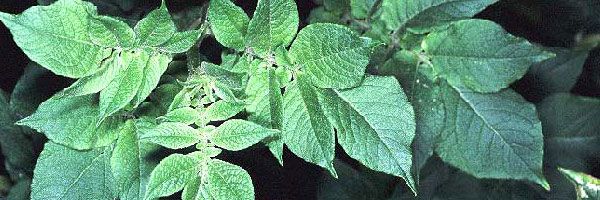Potato spindle tuber viroid
(PSTVd) and other viroids
- Causal agent and transmission
Viroids are small organisms known to cause serious diseases in plants and consisting of a single-stranded particle of genetic material (i.e.ribonucleic acid RNA), that is not protected by coat protein as opposed to viral RNA.
Potato spindle tuber viroid is easily transmissible by contact and hence may be mechanically disseminated from plant to plant or with contaminated equipement, tools, skin or clothes during field operations. Cutting seed potatoes before planting increase the risk of disseminating the viroids. The transmission of PSTVd by chewing and sucking insects has been reported but it has been shown that in potato crops, aphids can spread the disease efficiently only if they are already carrying Potato leaf roll virus (PLRV).
Besides infected seed-tubers, PSTVd is also transmitted by the pollen of potato and tomato flowers. True botanical potato seeds produced by an infected plant may be up to 100% infected with PSTVd.
- Significance
PSTVd is a serious threat for host crops such as the potato and the tomato but natural infection by PSTVd has also been recorded in avocado, aubergines, pepinos, peppers and wild Solanum species. Natural infection of ornamentals such as Solanum jasminoides or weed hosts in the Solanum family (such as nightshades) has also been recorded. On potato, yield losses vary with the strain, the cultivar and the growth conditions but may reach 65 to 80% for severe PSTVd strains.
- Other viroids
The only viroid known to infect naturally cultivated species of potato is the Pospiviroid Potato spindle tuber viroid (PSTVd) but other viroid species in the genus Pospiviroid, e.g. Citrus exocortis viroid (CEVd), Columnea latent viroid (CLVd), Chrysanthemum stunt viroid (CSVd) and Tomato chlorotic dwarf viroid (TCDVd) may infect tomato and/or ornementals naturally. Experimentally, they have been shown to infect cultivated potato species. Such experimental infection with other pospiviroids may result in severe symptoms with strong tuber distorsion and elongation, similar to PSTVd.






